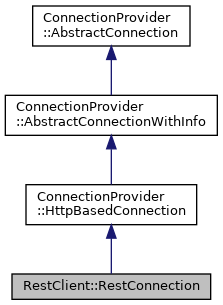 |
Qore RestClient Module Reference
1.9
|
 |
Qore RestClient Module Reference
1.9
|
class for REST HTTP connections; returns RestClient::RestClient objects More...

Public Member Methods | |
| constructor (string name, string description, string url, hash< auto > attributes={}, hash< auto > options={}) | |
| creates the RestConnection connection object More... | |
| DataProvider::AbstractDataProvider | getDataProvider () |
| returns a data provider object for this connection More... | |
| *hash< auto > | getDefaultOptions () |
| returns default options | |
| hash< auto > | getOptions () |
| gets options More... | |
| string | getType () |
returns "rest" | |
| bool | hasDataProvider () |
| returns True, as this connection always returns a data provider with the getDataProvider() method More... | |
Static Public Member Methods | |
| static hash< auto > | processOptions (*hash< auto > opts) |
| processes options for the constructor More... | |
Public Attributes | |
| const | ConnectionScheme |
| Connection entry info. | |
| const | DefaultOptions = ... |
| default options | |
| const | OptionList = keys ConnectionScheme.options |
| object connection option list | |
| const | Options = map {$1: True} |
| object connection options | |
| hash< auto > | real_opts |
| real options used when creating an object | |
Private Member Methods | |
| hash< ConnectionSchemeInfo > | getConnectionSchemeInfoImpl () |
| Returns the ConnectionSchemeInfo hash for this object. | |
| RestClient | getImpl (bool connect=True, *hash< auto > rtopts) |
| returns a RestClient object More... | |
| setChildCapabilities () | |
| Sets child data provider capabilities. | |
class for REST HTTP connections; returns RestClient::RestClient objects
supports the following options:
"connect_timeout": connection timeout to use in milliseconds"content_encoding": this sets the send encoding (if the "send_encoding" option is not set) and the requested response encoding; for possible values, see EncodingSupport"data": see RestClient::RestClient::DataSerializationOptions for possible values when used with the null REST schema validator; the default is "auto" "error_passthru": if True then HTTP status codes indicating errors will not cause a REST-RESPONSE-ERROR exception to be raised, rather such responses will be passed through to the caller like any other response"headers": an optional hash of headers to send with every request, these can also be overridden in request method calls; also a string giving headers can be given in the format: header1=value, header2=value; the value will be parsed with parse_to_qore_value()"http_version": HTTP version to use ("1.0" or "1.1", defaults to "1.1")"max_redirects": maximum redirects to support"proxy": proxy URL to use"redirect_passthru": if True then redirect responses will be passed to the caller instead of processed"send_encoding": a send data encoding option or the value "auto" which means to use automatic encoding; if not present defaults to no content-encoding on sent message bodies"swagger": the path to a Swagger 2.0 REST schema file for runtime API validation (see the Swagger module); conflicts with validator "swagger_base_path": in case a REST validator is used, the base path in the schema can be overridden with this option (applies to any REST validator; not just Swagger validators)"timeout": transfer timeout to use in milliseconds"validator": an AbstractRestSchemaValidator object to validate request and response messages; conflicts with swagger "validator": an AbstractRestSchemaValidator object for REST message validation (if present, overrides any REST schema validation option provided as a connection option)| RestClient::RestConnection::constructor | ( | string | name, |
| string | description, | ||
| string | url, | ||
| hash< auto > | attributes = {}, |
||
| hash< auto > | options = {} |
||
| ) |
creates the RestConnection connection object
| name | the name of the connection |
| description | connection description |
| url | connection URL (potentially with password info) |
| attributes | various attributes. See below |
| options | connection options |
See AbstractConnection::constructor() for attributes and options reference.
error a custom error string| CONNECTION-OPTION-ERROR | missing or invalid connection option |
| DataProvider::AbstractDataProvider RestClient::RestConnection::getDataProvider | ( | ) |
returns a data provider object for this connection
SwaggerDataProvider: if an appropriate schema is configuredRestClientDataProvider: if there is no schema configured| DATA-PROVIDER-ERROR | this object does not support the data provider API |
|
privatevirtual |
returns a RestClient object
| connect | if True, then the connection is returned already connected |
| rtopts | supports the following runtime option in getImpl():
|
Implements ConnectionProvider::AbstractConnection.
| hash<auto> RestClient::RestConnection::getOptions | ( | ) |
gets options
"connect_timeout": connection timeout to use in milliseconds"content_encoding": this sets the send encoding (if the "send_encoding" option is not set) and the requested response encoding; for possible values, see EncodingSupport"data": see RestClient::RestClient::DataSerializationOptions for possible values when used with the null REST schema validator; the default is "auto" "error_passthru": if True then HTTP status codes indicating errors will not cause a REST-RESPONSE-ERROR exception to be raised, rather such responses will be passed through to the caller like any other response"headers": an optional hash of headers to send with every request, these can also be overridden in request method calls; also a string giving headers can be given in the format: header1=value, header2=value; the value will be parsed with parse_to_qore_value()"http_version": HTTP version to use ("1.0" or "1.1", defaults to "1.1")"max_redirects": maximum redirects to support"proxy": proxy URL to use"redirect_passthru": if True then redirect responses will be passed to the caller instead of processed"send_encoding": a send data encoding option or the value "auto" which means to use automatic encoding; if not present defaults to no content-encoding on sent message bodies"swagger": the path to a Swagger 2.0 REST schema file for runtime API validation (see the Swagger module); conflicts with validator "timeout": transfer timeout to use in milliseconds"validator": an AbstractRestSchemaValidator object to validate request and response messages; conflicts with swagger | bool RestClient::RestConnection::hasDataProvider | ( | ) |
returns True, as this connection always returns a data provider with the getDataProvider() method